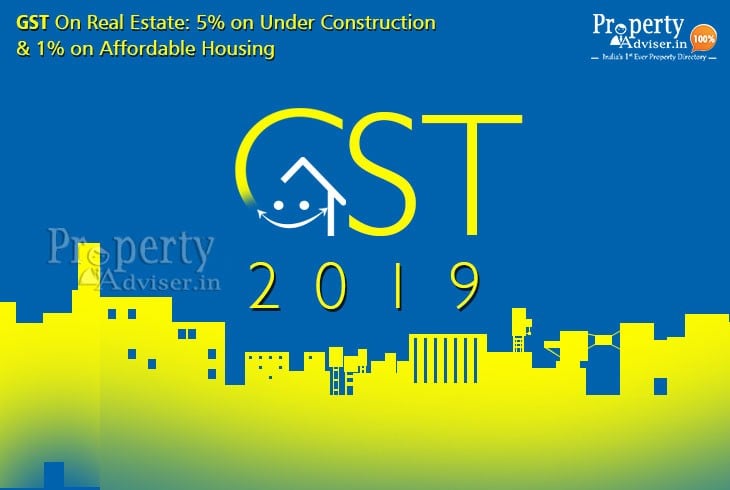GST Council has approved the proposal of 5 percent tax on residential properties and 1 percent for affordable housing. These taxes are valid from 1st April 2019.
There is a huge change in the GST rate in the real estate sector. Many buyers have confusion about the applicability of GST for real estate. However, recently the GST Council has issued a clarification regarding the applicability of Goods and Services Tax (GST) on the under-construction and ready to move properties in Hyderabad and other states.
Let us understand in brief about the new GST rate on under-construction property and ready to move properties.
Is GST Rate Applicable On Ready-To-Move-In Properties?
Transfer of completed property will not have any service part to the buyer. Hence, GST will not be applicable in such sale transactions. So, if you buy a ready to move property, then you may save the GST cost.
Is GST Rate Applicable On Under Construction Properties?
The proposed new GST rate on under-construction property will be classified as below.
- If the builder got the completion certificate before you purchase it, then it is considered as ready-to-move-in property. Therefore, no GST on such properties.
- If you paid the full amount of property after the GST implementation, i.e. 1st July 2017, in such transactions GST is payable by the buyer.
Apartments in Hyderabad starts from 15 Lakhs
Plots in Hyderabad below 5 Lakhs
Villas in Hyderabad below 80 Lakhs
Key Points of New GST Proposal
- The GST rate on under-construction property or ready-to-move-in flats, where the completion certificate is not issued at the time of sale is currently at 12% with full Input Tax Credit (ITC). For affordable homes, the existing tax rate is 8%.
- On 24 Feb 2019, GST Council decided that after removal of ITC, the rates will be 5 % for normal housing projects and 1 % for affordable homes.
- A residential property, with a carpet area of up to 90 sq.mts in non-metropolitan cities and 60 sq.mts in metro cities (Delhi-NCR, Bengaluru, Chennai, Hyderabad, Mumbai-MMR and Kolkata) with the value up to Rs 45 lakhs would fall under the affordable housing category.
- Effective from 1st April 2019, the GST applicable for affordable homes is 1% without Input Tax Credit (ITC).
Know In Detail About the New GST Rate in a Tabular Form As Below.
| Type Of House | Existing GST Rate | New GST Rate (1st Apr 2019) |
| GST On Premium & Normal Homes | 12% With ITC | 5 % Without ITC |
| GST On Affordable Housing | 8 % With ITC | 1% Without ITC |
Advantages of New GST Rates
- The reduction in GST rates will give a boost to the Housing for All mission and fulfill the aspirations of the middle-class people.
- This decision is certainly going to give a good boost to ready to move apartments because people wait to buy completed properties to save the GST Cost.
GST for Affordable Housing
On the 33rd GST council meeting, the Government has proposed the relevant guidelines for the eligibility of affordable Housing. The residential property is qualified as affordable Housing in India where the total carpet area of the residential property should not exceed 60 sq.mts in metropolitan areas like Delhi NCR, Kolkata, Chennai, Hyderabad, Bengaluru, and Mumbai. In non-metropolitan cities and towns, the residential property carpet area should not be more than 90 sq.mts. In metropolitan and non-metropolitan cities, the price of affordable property should not be more than Rs 45 lakhs.
GST Rate Cuts on Residential Properties
The proposed GST rate cuts will be implemented from 1st April 2019 and have many benefits on residential properties. A simple tax structure leads to high compliance from the developers. Due to the 1% rate cut on affordable properties, there will be a fair price of real estate transactions to buyers. The interest of buyers protected due to the problems of ITC advantages is not passing to buyers. The better price on residential properties as the problem of unused ITC being added to project cost is eliminated.
GST Rates on Materials used for Property Construction
The GST for real estate sector is applicable in two ways. The key points are as follows
- The GST is applicable to different materials used for the construction process
- The service used for the construction of residential property.
The Government has introduced a 4-tier tax structure for all goods and services under the slabs- 5%, 12%, 18%, and 28%. These GST rates are given in the final cost of the property for the end-user, and the prices vary based on the stage of construction. The total applicable GST is calculated by adding State GST (SGST) and Central GST(CGST). For Example, it is calculated as below.
18% GST = 9% SGST + 9% CGST
12% GST = 6% SGST + 6% CGST
The basic construction cost may be low compared to premier properties, but as the input tax credit is limited to 12%. Under the new proposed GST, many of the construction materials come under the 18 and 28 percent slab. The steel and steel products mostly come under an 18 % tax. The cement and prefabricated structural components for building or civil engineering are in the 28 % tax slab. However, as the ITC is available on products utilized for construction and the overall tax incidence should be neutralized.
Nil GST for Construction-Related Transactions:
The proposed GST on real estate is not applicable for the sale of ready to move in flats, resale of property and sale or purchase of land. As per the GST Act, the sale-purchase activity does not include the supply of goods or services. Hence no GST is applicable to these types of real estate transactions.
GST on Stamp Duty and Registration Charges
Stamp duty and registration and stamp duty on real estate have continued to remain in place as state government taxes after GST. Stamp duty and registration charges vary from one state to another state. Also, these taxes may vary from one circle to another within the same state itself. As per the proposed GST, stamp duty and registration charges will be suitable for both already constructed and under construction properties across India. GST will be applicable only to under-construction properties.
Input Tax Credit for Builders
As per the proposed GST, the ITC (Input Tax Credit) can be claimed by the different inputs like cement, bricks, sand, labor, etc. which are part of the property construction process. The main reason for the implementation of ITC is to prevent a tax burden GST charged at each construction stage will be offset by ITC received on the GST charged in the preceding stage. At the time of the new proposal of GST and Input Tax Credit in real estate. The developers expected that they would pass on the ITC benefits received by them during the construction process to buyers. The ITC claims made by real estate developers are the total GST payable should be clearly analyzed by the builders with every unit used in the construction process. The cost of materials used for building is liable to change all construction projects. It provides accurate estimates of upfront costs and files for an input tax credit.
Will Ready to Move Properties Cost More?
The option to obtain full entry compensation credit enjoyed by developers in projects under construction will not be effective for ready-to-own houses. The developers believe that this would effectively increase the cost of owning property ready for buyers. While developers could still benefit from projects in developing stages, they would have to bear the tax burden of immediate possession projects, as they remain outside the GST realm.
Meanwhile, the Government has ordered developers to transfer property benefits to buyers that they can use under the new tax regime through reduced costs/fees. Also, the Government has informed all construction companies that use counting services that in apartments under construction, they must refrain from asking customers to pay a higher tax rate on the payments that will be received after the imposition of the GST.
Impact on the Real Estate Sector
Industry experts believe that, in regards to the residential real estate sector, the implementation of GST will act as a stimulus for property buyers, although developers may face some short-term challenges when it comes to constructing the property. There is an impact on the short-term of prices and on companies when it comes to filing tax returns. However, the benefits that it would obtain for the residential real estate sector would be profitable since the perception of the sector would improve with the simplified fiscal structure.
Why GST has a Positive Effect on the Real Estate?
Low Cost in Construction
GST will reduce the rate of items such as cement, steel, etc., which will lead to significantly lower construction costs. This will lower real estate prices and will eventually be a benefit to the common man.
Integrated Tax System
In general, it is crucial in the real estate industry to have a uniform tax base. Builders and developers currently pay taxes even on the purchase of their raw materials. GST addresses these problems by making all taxes uniform.
Neutral Income Rate
The method of fiscal operation in the real estate sector is not synchronized between VAT and service tax laws. This type of problem can be mitigated with the help of GST that would help maintain a transaction system: the neutral income rate (RNR), which is determined by state goods and services taxes (SGST) and central tax departments on goods and services (CGST).
Ease of Compliance
With the help of GST, it will be easier to maintain an audit trail for better control and monitoring, and will fully benefit the Indian real estate sector. It will effectively reduce the complexity of compliance, providing efficiency, and a smooth transaction.
In general, the Goods and Services Tax (GST) will have a marginal impact on the real estate sector in the coming days. There will be notable improvements in the trust of the buyers and the perceptions of change that the buyers have had against this sector. Developers will also find it much easier to work with the GST, with the benefit of the tax credit contribution as an additional advantage. As per the report of leading developers, the year 2019 is expected to have a hike in demand for both commercial and residential properties for sale in Hyderabad.
Property Adviser team collects information, analyze and verify the details, take pictures of every project and update the information every month on the website. It helps you to get the latest information on every project in Hyderabad. Choose the best flat from 395 ready to move apartments in Hyderabad. You can classify projects by location, budget range, unit type (1 BHK, 2 BHK, 3BHK and so on), and occupancy time and so on. Visit us and reach your dream home quickly.
By: Shailaja K















